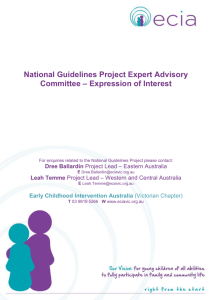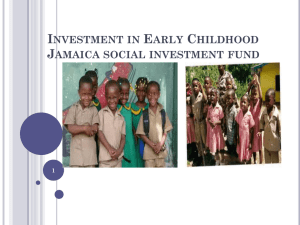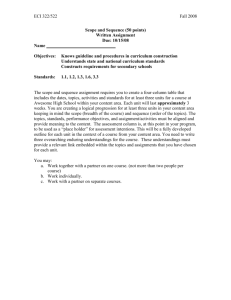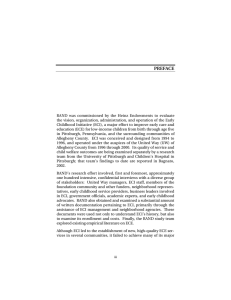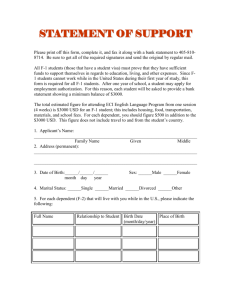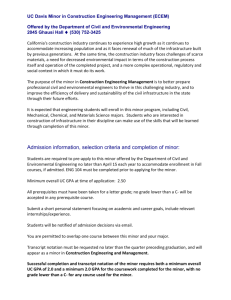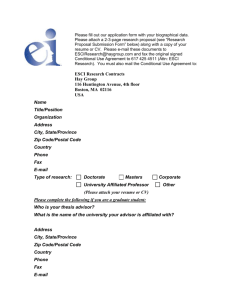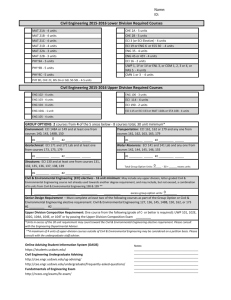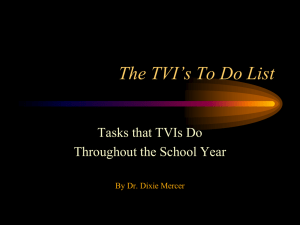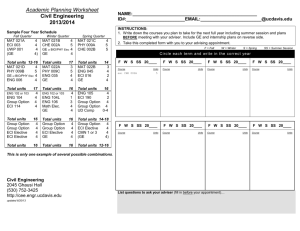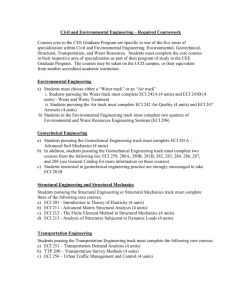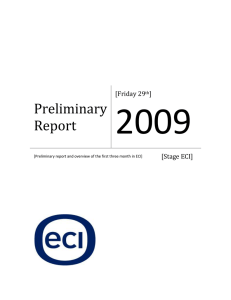ToRExpertAdvisoryGroup
advertisement
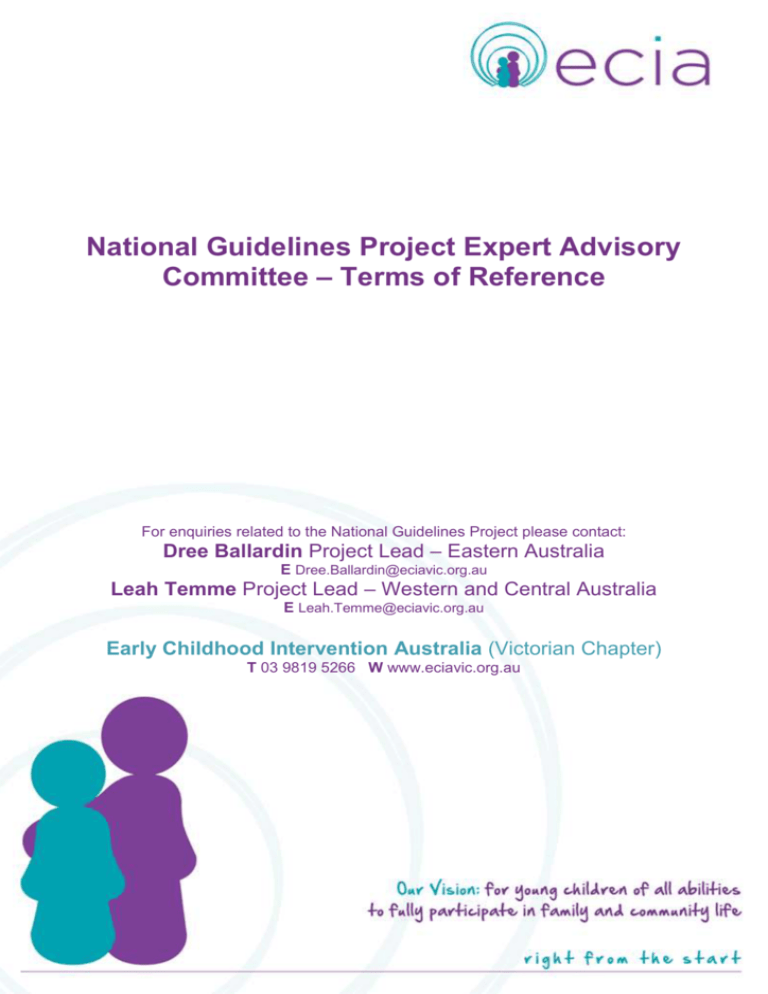
National Guidelines Project Expert Advisory Committee – Terms of Reference For enquiries related to the National Guidelines Project please contact: Dree Ballardin Project Lead – Eastern Australia E Dree.Ballardin@eciavic.org.au Leah Temme Project Lead – Western and Central Australia E Leah.Temme@eciavic.org.au Early Childhood Intervention Australia (Victorian Chapter) T 03 9819 5266 W www.eciavic.org.au Background Early Childhood Intervention Australia (ECIA) is the peak national organisation promoting the interests of young children with disabilities and developmental delays and their families. ECIA is dedicated to ensuring that young children of all abilities can fully participate in family and community life. The National Disability Insurance Agency (NDIA) has asked ECIA to provide recommendations for a set of national guidelines for minimum standards in Early Childhood Intervention (ECI) service delivery for the National Disability Insurance Scheme (NDIS). The NDIS is new to disability service provision in Australia and provides a set of agreements which ensures that there is a single consistent scheme for the provision of disability support services across all Australian states and territories. It provides funding directly to individuals who are able to choose their own services and purchase directly to providers. The NDIS will essentially mean the end to ‘block funding’ from government to service providers. Current models of service delivery in Australia vary across and within states and territories. Whilst diversity of practice is valued for its contribution to innovation and its capacity to tailor NDIS support to individual children and their families, there is a need to focus more on outcomes for children. As a national scheme the NDIS requires guidelines that may be consistently applied in all states and territories, so children and families are not treated differently because of their location. The national guidelines will be based upon national and international best practice evidence in ECI service delivery. Purpose of the Expert Advisory Committee The purpose of the Expert Advisory Committee is to provide technical advice to the Project Team and support the National Guidelines project as needed. The Expert Advisory Committee will bring together a collection of individuals who bring expert knowledge and skills within the field of ECI which complement the knowledge and skills of the National Guidelines Project Team. The Expert Advisory Committee will not have formal authority to govern the project nor issue directives that must be followed. Rather, the Expert Advisory Committee serves to make recommendations and/or provide key information and materials to the National Guidelines Project Team. The Expert Advisory Committee role includes: Providing advice on best practice in ECI nationally and internationally. Providing an overview of current models of ECI service delivery across all Australian states and territories. Assisting with identifying key ECI stakeholders for the consultation workshops. Provide independent, unbiased insights and ideas from a third point-of-view. Incorporate additional layers of diversity and new perspectives within the Project Team. Advocating for the project. Proposed Members and Roles Chair (Dree Ballardin and Leah Temme) National Guidelines Project Leads. Academic Representative Current contributor to research on best practice in Early Childhood Development and Intervention. Parent/Carer Representative Including Parent/Carer advocacy groups who are able to represent the views and experiences of parents/carers who receive ECI support. Federal Government Representative Able to represent the Federal Government policy, legislation and views on ECI service provision and funding. State/Territory Government Representative Able to represent State/Territory Governments policy, legislation and views on ECI service provision and funding. Service Provider Representative Current provider of ECI services and able to represent views of both large and small Service Provider organisations. Sole Provider Representative Current provider of ECI services. ECI Professional Representative Currently delivering ECI therapy or represents an ECI professional body. Rural and Remote Australia Representative Provides expertise in identifying current challenges and potential issues with delivering ECI services in rural and remote settings. Culturally and Linguistically Diverse Representative Provides expertise in identifying challenges and potential issues in providing ECI services to culturally and linguistically diverse children and families including Aboriginal and Torres Strait Islander communities. Expert Advisory Committee Members should: Understand the strategic implications and outcomes of the National Guidelines project. Appreciate the significance of the National Guidelines project for some or all major stakeholders and represent their interests. Be genuinely interested in the initiative and the outcomes being pursued in the National Guidelines project. Be experts in their domain and well regarded within their community of practice. Expert Advisory Committee members are also expected to communicate with those they represent on issues and to carry the group’s perspective to Committee meetings and discussions. Task and Time Requirements The reference group will operate from March 2015 until July 2015 (membership may vary over this time) Task Read and respond to email information Group discussion via teleconference Seek ideas and information from peers and provide information back to the Steering Committee as appropriate Time required 4 hours monthly 2 hours monthly Where As appropriate Local Local Local Group rules 1. Each member commits to all tasks listed. 2. All participation time is self-funded however teleconferencing costs are covered via the project budget. 3. Each member will seek reflections and suggestions from their peers in preparation for each meeting. 4. Group discussions will be facilitated with all participant expected to contribute. 5. Each member will declare any conflicts of interest upfront in all meetings, discussions and correspondence. Meeting procedures The reference group will determine its own specific meeting procedures at the first meeting however procedures will include: Meetings will be chaired by the Project Lead or a nominated person. Minutes will be taken by a Project Team member or a nominated person. Meeting notes will be kept to enable an understanding of how decisions and outcomes were made. The minutes of meetings will be emailed to members as soon as practicable after the meeting. The meeting notes of the previous meeting, agenda, and all relevant documents will be distributed to members at least one week before the next meeting. The group will use whatever means of communicating with each other between meetings that is most appropriate including email/personal contact/telephone/ etc. Code of Conduct The Code of Conduct for the reference group includes: Respect others’ opinions and remain issues-focused on the key area. Recognise that two people can perceive the same set of circumstances differently. Be flexible, listen robustly and value other members’ views. Be constructive and topic focused. Feel free to contribute within the scope of the focus area. Be concise in presenting views. Discuss issues within the agenda and timeframes. Consult within the group regarding all conversations and contribute with honesty and a commitment to trust.
